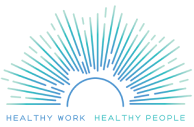This week, the Healthy Work Campaign, the Center for Social Epidemiology and collaborating researchers, are proud to have launched the Healthy Work Survey – For Individuals. This free, anonymous, online tool is for individual working people to assess the “health” of their work, and to identify the kinds of stress they might be experiencing that impacts health and well-being. A Healthy Work Survey for organizations (labor unions, worker groups, employers) is under development and will be available in the near future.
How to take the survey – click HERE
The survey takes about 20 minutes to complete, and is anonymous and confidential. If you choose to provide your email address, a free report of your results will be emailed to you, and your email address will be deleted after sending. Your results will show your scores and your level of “risk” for some common work stressors compared to the scores of a nationally representative U.S. working population from the NIOSH Quality of Work Life questionnaire. The email report includes links back to the HWS for Individuals webpage with explanations about the meaning of “high risk” for the different work stressors. Most importantly, we provide links to tools and resources showing what others have done to address these work-related stressors and what you could do also.
Why do I need to complete the HWS survey?
Many of us know when we are stressed at work or that our work is stressful. But some features of the workplace can cause chronic stress that you may not be aware of. While stress is a natural response to real or perceived threats, chronic stress has been found to arise from particular kinds of “psychosocial hazards” in the workplace. “Psychosocial” work stressors have been studied by researchers for over 40 years and many other countries regulate them like other workplace hazards. They include job characteristics like psychological demands & low job control or “job strain,” effort-reward imbalance, lack of social support, work-family conflict, bullying, and long work hours. These have been shown to impact mental and physical health in working populations.
So while “stress at work” seems commonplace, it doesn’t have to be that way. You can meditate, do yoga, take stress management classes to manage your “symptoms”; but if you walk into the same toxic work environment day after day, these practices will do little to prevent the long-term effects of chronic work stressors. So we suggest ways to improve work itself.
The HWS is an educational tool intended to raise awareness, and start discussions about how to improve the quality of your job and prevent mental or physical health problems. For more information contact us at contact@healthywork.org






